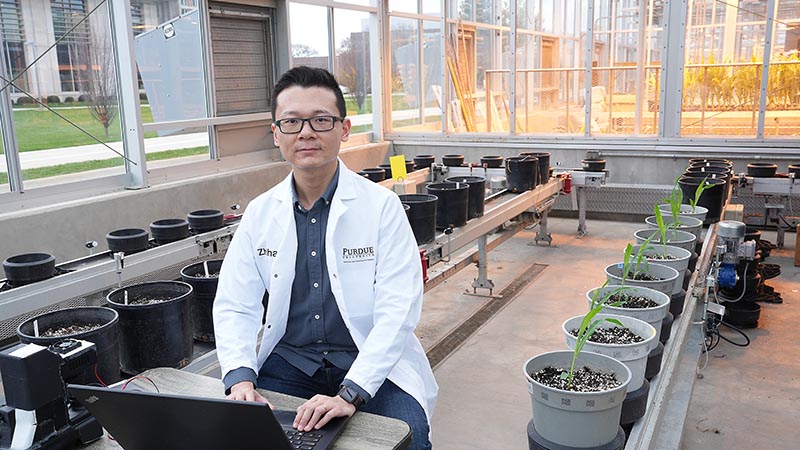Zhihang Song - Graduate Ag Research Spotlight
The most fascinating part of this field is the exploration of the unknown. What we do know is that this is going to benefit the whole world.
- Zhihang Song, PhD student, Department of Agricultural and Biological Engineering
The student
Wheat and corn production is crucial in Henan Province, Zhihang Song’s home in central China. When it came time to choose a college major, he thought about what he’d seen in the fields near his hometown — hard-working farmers without much modern machinery or knowledge he’d seen showcased on U.S. media. He enrolled in a 2+2 program between China Agricultural University and Purdue, spending his first two years at CAU and his junior and senior years in West Lafayette, and earning bachelor’s degrees in agricultural engineering from both universities. “Experiencing education from two distinct cultural and systematic perspectives was truly eye-opening,” he says. In his first semester at Purdue, he attended a seminar by Jian Jin, associate professor of agricultural and biological engineering, who was also new to campus. Song was so intrigued by Jin’s presentation “about his vision of agricultural production in the future with a lot of robots, sensors and artificial intelligence” that he went to Jin’s office immediately after the seminar to discuss it further. Song would become Jin’s first undergraduate researcher, joining the professor and one postdoc in Jin’s new lab. Song’s skills grew with the lab, helping to develop simple sensing technology that evolved into LeafSpec, a pioneering handheld corn leaf hyperspectral image scanner that detects disease, herbicide and nutrient stress. As a master’s student, Song worked on two major projects — LeafSpec and MISIRoot, a minimally invasive robot for plant root phenotyping. He considered other PhD programs but accepted Jin’s invitation to stay on his team. “To me, the most beautiful thing here is the great team atmosphere,” Song says. “And a supportive department like a family.” He started his doctoral work in 2020.
THE RESEARCH
“Working with cutting-edge technologies like LeafSpec, we are discovering new things and valuable information hidden in the data,” Song says of his research focus. Using images from LeafSpec, Song developed innovative feature engineering methods combined with image processing, statistical machine learning, deep learning and inspirations from plant science. “Right now, our current goal is to accurately identify if there’s a health issue with the plants so we can provide actionable insights for the farmers or breeders to achieve greater efficiency, productivity and sustainability,” he explains. The technology allows corn growers to more precisely apply fertilizers to maximize yield and minimize pollution and is applicable to other nutrients as well, he adds.
opportunities
His advisor, Song says, “doesn’t feel like a high-end supervisor to me. He is more a teammate and also a team leader to guide us toward different directions.” Song also credits Jin for encouraging him to present at major conferences but also not to lose sight of networking opportunities. As a TA for two semesters for Design of Electronics Systems, Song helped undergraduates learn about electronic systems and the programming of an automatic line-following robot as their final project. He received the College of Engineering’s Magoon Excellence in Teaching Award.
future plans
Song expects to complete his degree in early 2024 and is applying for positions both in academia and industry. In 2022, he worked as a hyperspectral imaging scientist at Bayer Crop Science in a six-month co-op experience that allowed him to explore the industry while learning technical skills that could benefit his research. Song spends his time away from the computer weightlifting at the gym and cooking his favorite dishes for his family and friends. He enjoys travel and has visited much of the U.S. East Coast and South.





